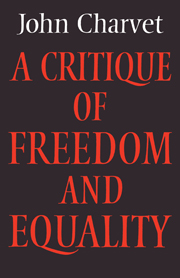Summary
THE RELATIVITY OF VALUE
A major element in the individualist theory which must be abandoned if a more satisfactory and coherent understanding of moral value is to be obtained is the requirement of authenticity. This is the requirement that the individual have only himself as his end in his particular life, the requirement of self-determination and the exclusion of other-determination in respect of particular life. One way of allowing another to enter into the determination of one's particular life is by choosing one's life having regard, not simply to oneself, but to another person as a valuer of that life. The value one's life has for him enters into the formation of one's choices, and he becomes co-determiner with oneself of it. The requirement of authenticity, then, would be dropped, and one would accept that the value of one's particular life is as much determined by the value it has for another as by its value for self.
Authenticity itself is a corollary of the more fundamental axiom that individuals have value in themselves. For this is the claim that individuals have value in an unmediated relation to themselves, and that the value they have for others is a consequence of the value they have in themselves. This claim must be denied, and it must be affirmed that the value of the individual for another arises in, or is the creation of, the relation that comes into existence between those particular persons. This rejection of the absolute value of the individual, and the affirmation of his value in relation to other individuals is a necessary condition of a coherent account of the possibility of morality.
- Type
- Chapter
- Information
- A Critique of Freedom and Equality , pp. 157 - 200Publisher: Cambridge University PressPrint publication year: 1981

